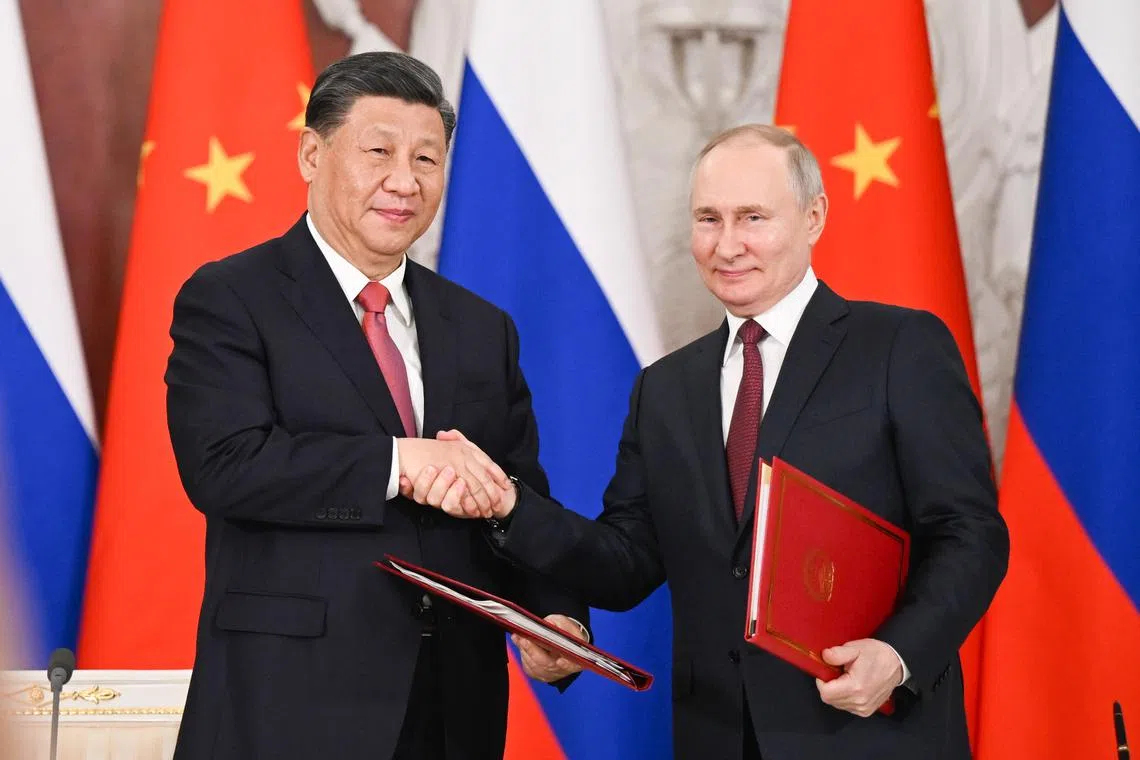China’s EU ambassador tries to distance Beijing from Moscow
Sign up now: Get ST's newsletters delivered to your inbox

Chinese President Xi Jinping and Russian President Vladimir Putin had signed a statement declaring “no limits” to their countries’ friendship.
PHOTO: EPA-EFE
Follow topic:
BRUSSELS – In an hour-long interview before a European diplomatic mission to Beijing, China’s ambassador to the European Union said that critics had misinterpreted his country’s relationship with Russia and suggested that their ties may not be as limitless as their leaders once declared.
The Chinese ambassador, Mr Fu Cong, spoke before French President Emmanuel Macron and European Commission President Ursula von der Leyen were to travel to China on Wednesday
EU leaders are struggling to balance their deep trade ties with China against US pressure to toughen their policies, especially in the light of China’s support for Russia since the war in Ukraine began.
China tries to present itself as a mediator,
Here are a few highlights of the interview:
Mr Fu played down Russia and China’s declaration of a “no limits” friendship.
Just three weeks in 2022 before Russia invaded Ukraine, Russian President Vladimir Putin and Chinese President Xi Jinping signed a joint statement declaring “no limits” to their countries’ friendship.
But Mr Fu said that China was not on Russia’s side on the war and that some people “deliberately misinterpret this because there’s the so-called ‘no limit’ friendship or relationship”.
He added: “‘No limit’ is nothing but rhetoric.”
Mr Fu said that China had not provided military assistance to Russia nor recognised its efforts to annex Ukrainian territories, including Crimea and Donbas.
Beijing has not condemned the invasion, he said, because it understood Russia’s claims about a defensive war against Nato encroachment, and because his government believes “the root causes are more complicated” than what Western leaders say.
He defended the fact that Mr Xi has not yet called Ukraine’s President Volodymyr Zelensky.
Mr Fu insisted the lack of a call was of no great importance, that Mr Xi is very busy, and that there were frequent lower-level contacts between the two countries.
Western analysts have contrasted that lack of communication with the close contact of Mr Xi and Mr Putin, including a trip by Mr Xi to Moscow last month.
“I know people are fixated on the presidential call,” Mr Fu said.
“The fact that President Xi is not speaking to Zelensky does not signify that China is on the side of Russia on the Ukrainian issue.”
China will not provide arms for Russia to use in Ukraine, the ambassador said.
Mr Fu blasted US Secretary of State Antony Blinken for saying in February that China was considering providing Russia with lethal weapons.
He said a speech by the European Commission President revealed incoherence in EU policy towards China.
“I had the impression as if two people are quarrelling with each other,” Mr Fu said.
“So this ambivalence signifies that Europe has not formulated a coherent policy towards China.”
In her speech, Ms von der Leyen described the EU-China relationship as having become “more distant and more difficult”, and endorsed the view of China as an assertive global player seeking to become “the world’s most powerful nation”.
But Mr Fu welcomed her statement that the bloc should “de-risk” its relationship with China by setting new ground rules rather than “decoupling” or withdrawing.
“I think that is a positive message, we have to give her that,” he said.
China and EU nations have significant trade ties – China was the third-largest destination of EU exported goods in 2022, and the largest exporter of goods to the bloc – and Mr Fu said this week’s trip would be an opportunity to refocus on the fundamentals of that relationship.
Mr Fu suggested that China was open to a deal with Europe on sanctions and investment.
There are hurdles beyond China’s stance on Ukraine, including issues of human rights.
The EU imposed sanctions on Chinese officials and entities
Beijing responded with sanctions on EU lawmakers, and an EU-China investment agreement has been politically frozen since.
Mr Fu said that he hoped both sides would remove sanctions and finalise the stalled trade deal, known as the Comprehensive Agreement on Investment.
EU diplomats said that in private meetings in recent weeks, Mr Fu has suggested that China could unilaterally lift its sanctions if it helped unblock the agreement and produced a form of reciprocal response.
“We are open to suggestions if they think that if China does one thing, and we’ll be able to do another. Well, let’s talk about this, and we’ll be happy to explore all avenues,” Mr Fu said of the European side.
He urged Europe to carve out its own policies distinct from the U.S., striking a key Chinese talking point.
In addition to criticising Mr Blinken, Mr Fu accused the US of unfairly trying to contain China’s development under the pretext of security concerns.
He said Europe should carve out its own policies and develop more “strategic autonomy,” instead of following Washington’s lead.
In saying this, Mr Fu hit on an open question in EU policymaking circles: Had Europe drawn too close to the US after their deep alignment over supporting Ukraine, and did this now pose a risk of Europe not acting in its own interests vis-a-vis China?
That question is the backdrop to Mr Macron’s visit, as it was to the visit of German Chancellor Olaf Scholz in November, with both accompanied by businessmen eager to continue to do deals with China.
“EU claims to be a big centre, a power centre in the world, an independent power centre in the world, as much as the United States, as much as China,” Mr Fu said.
“So why does it have to listen to the United States all the time?” NYTIMES

